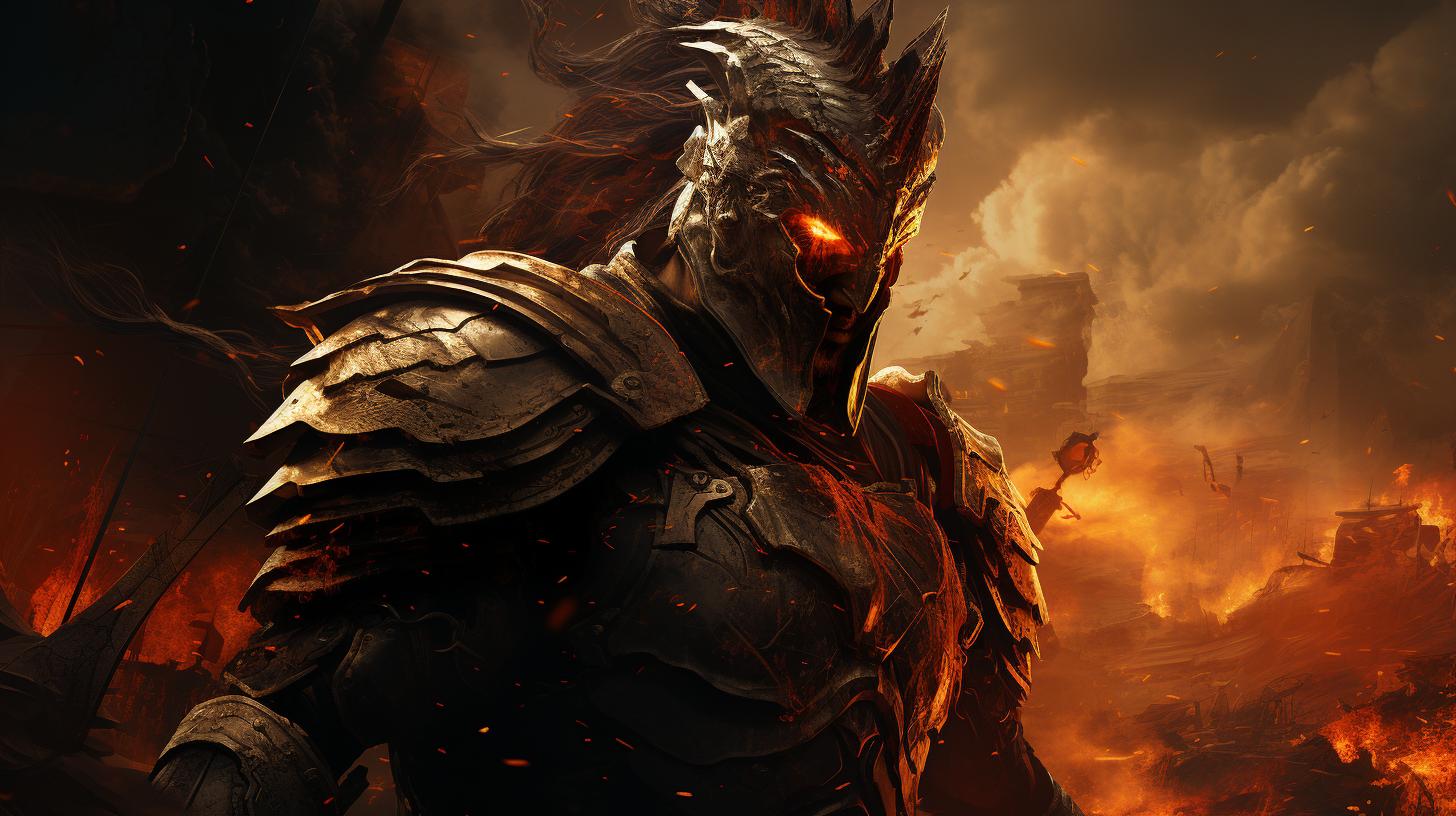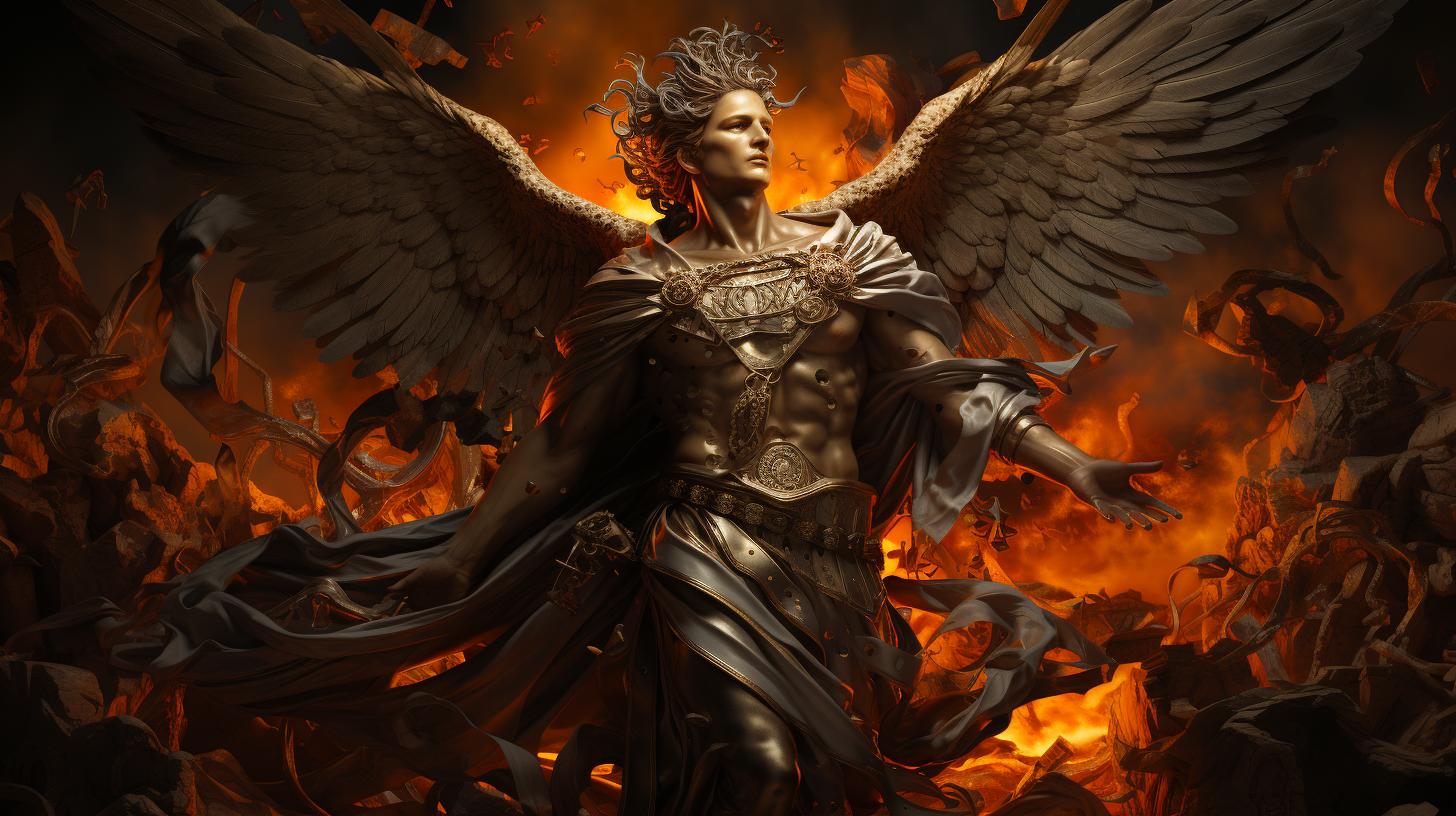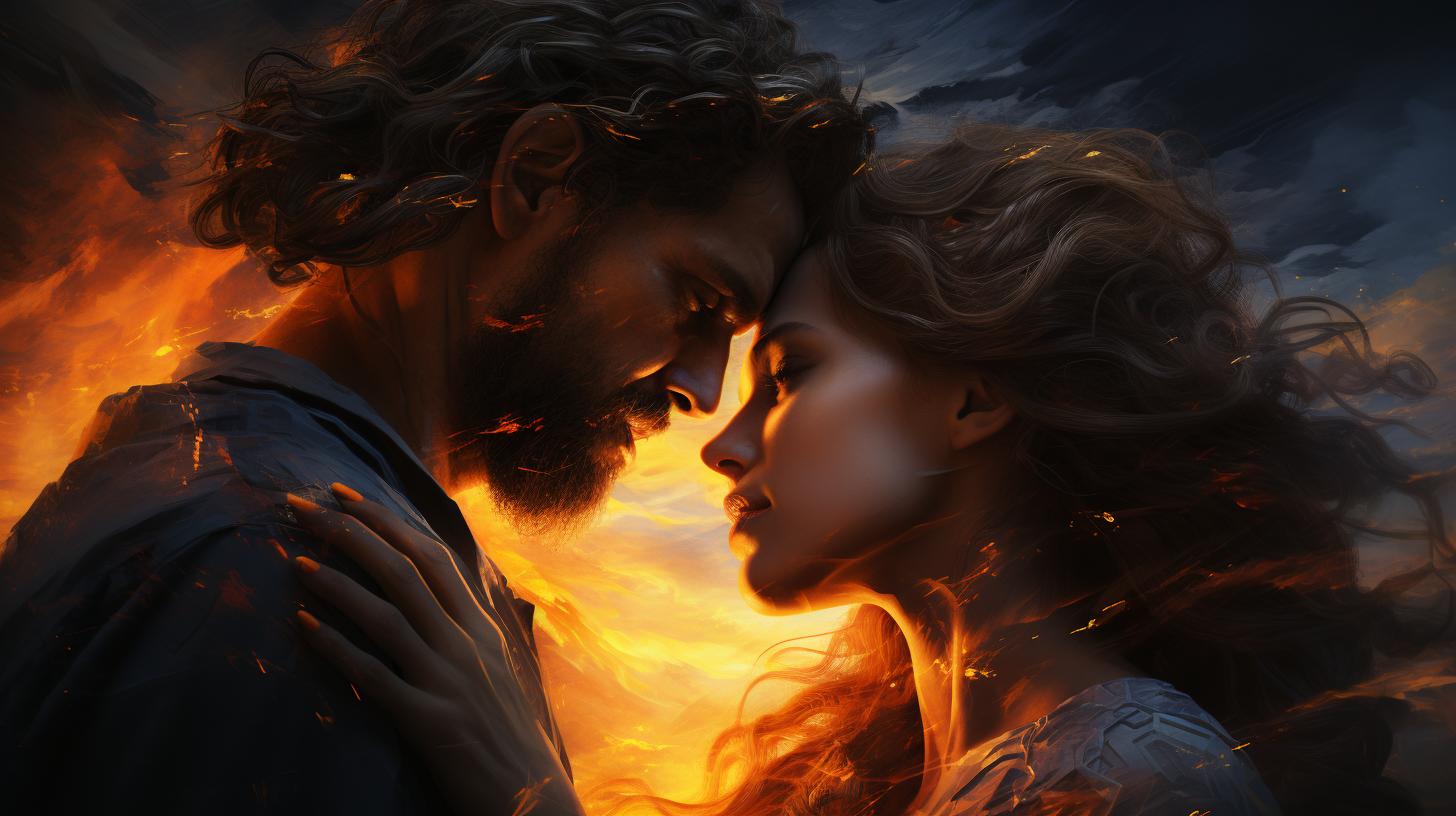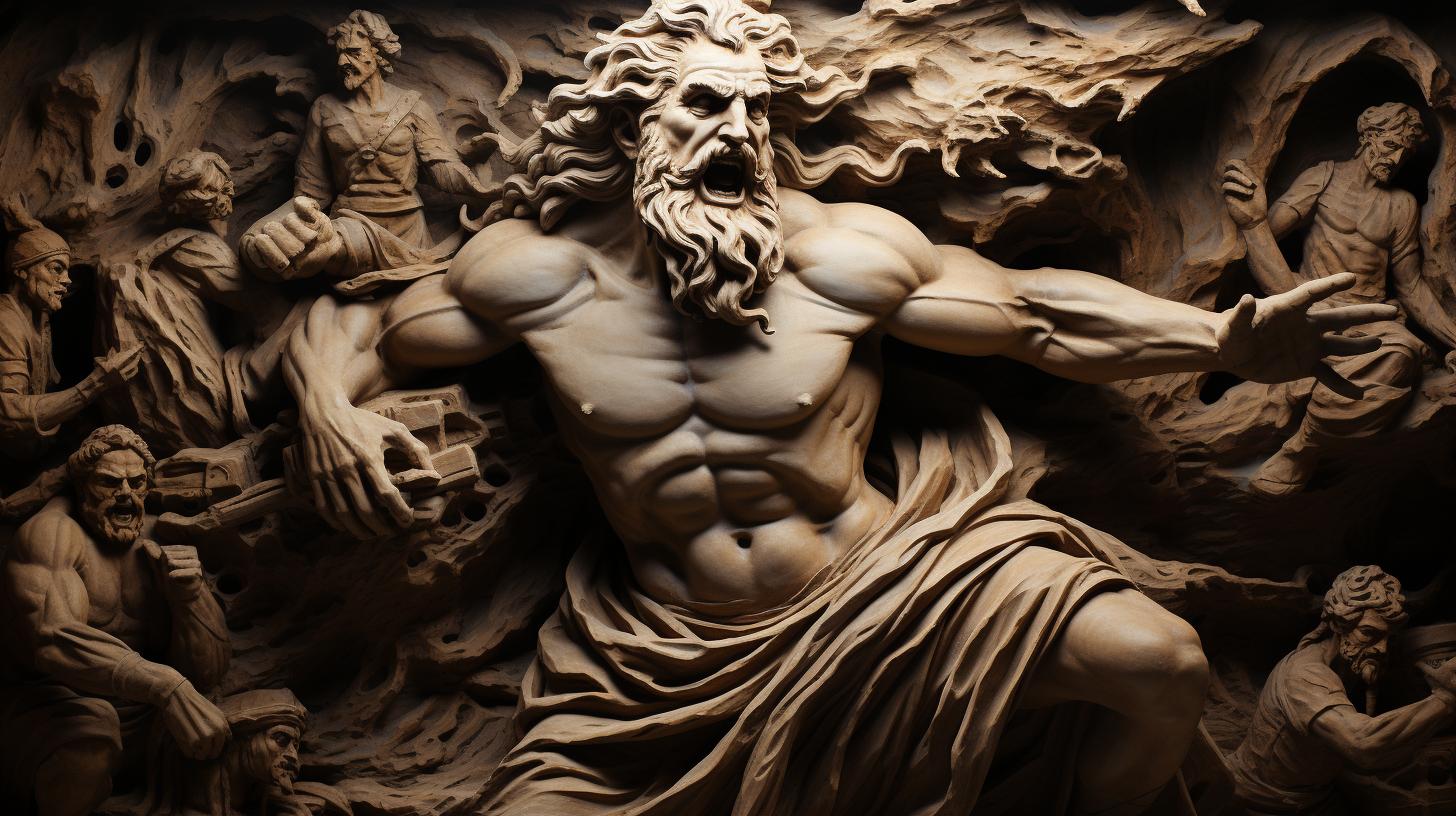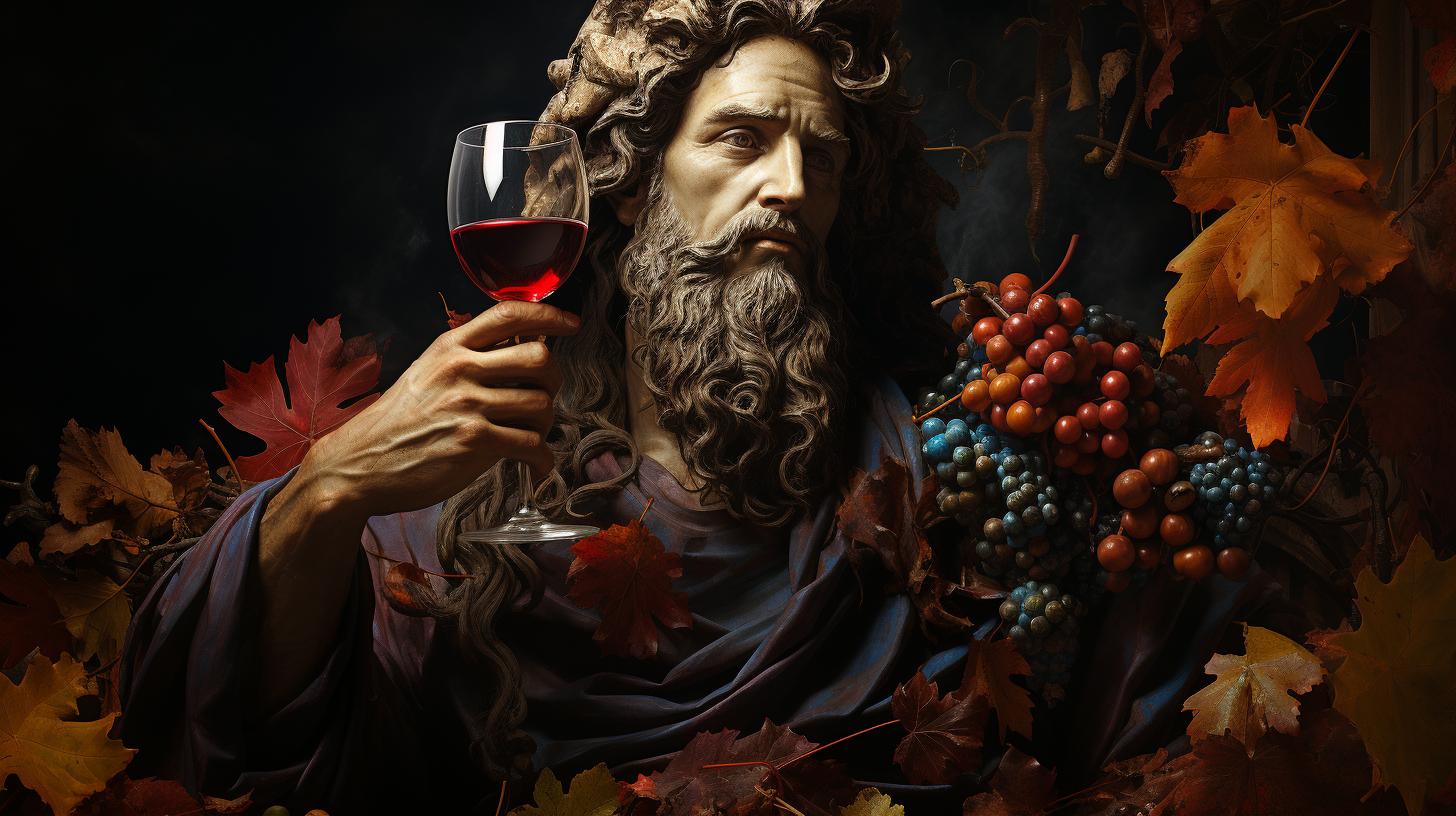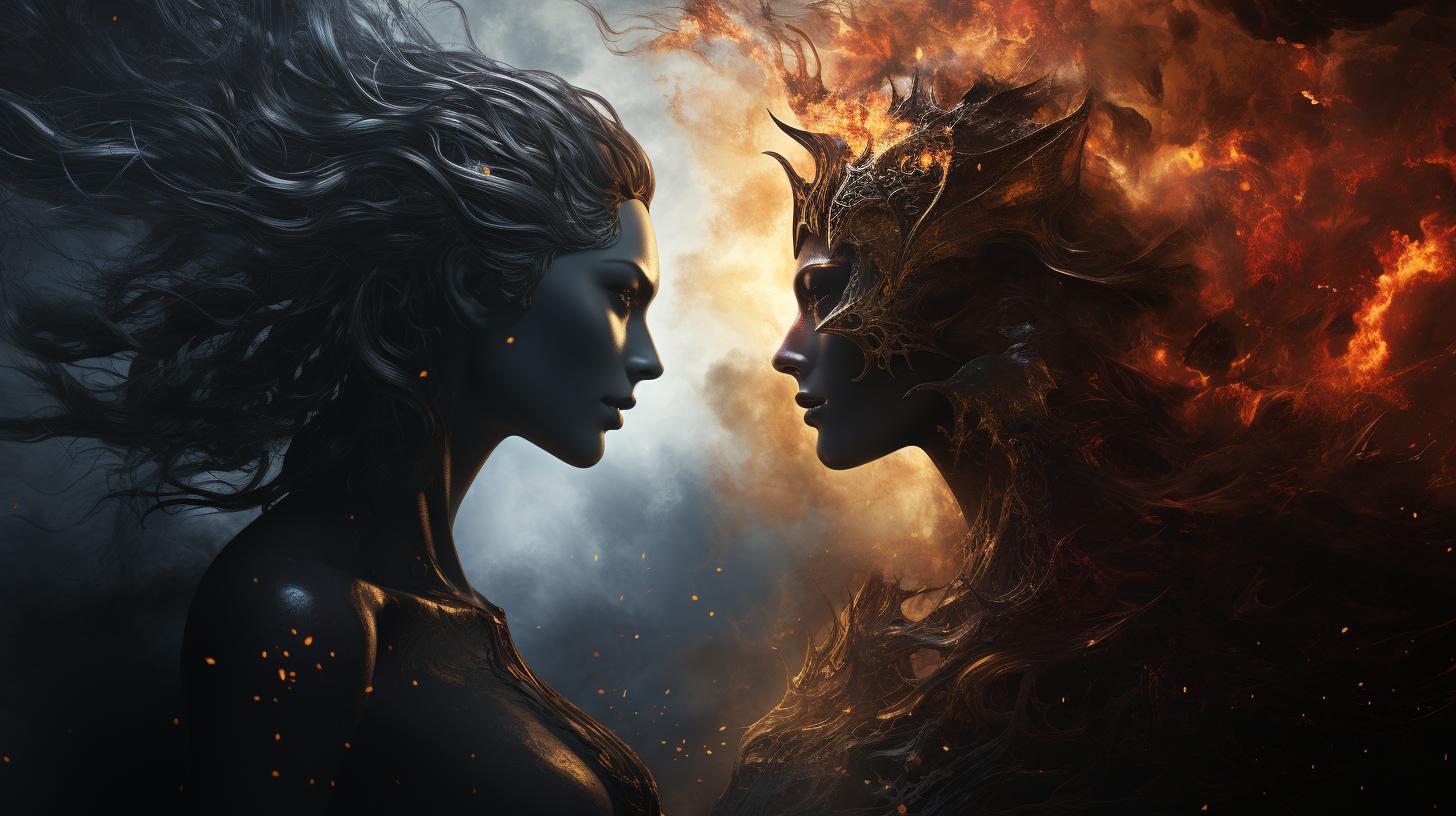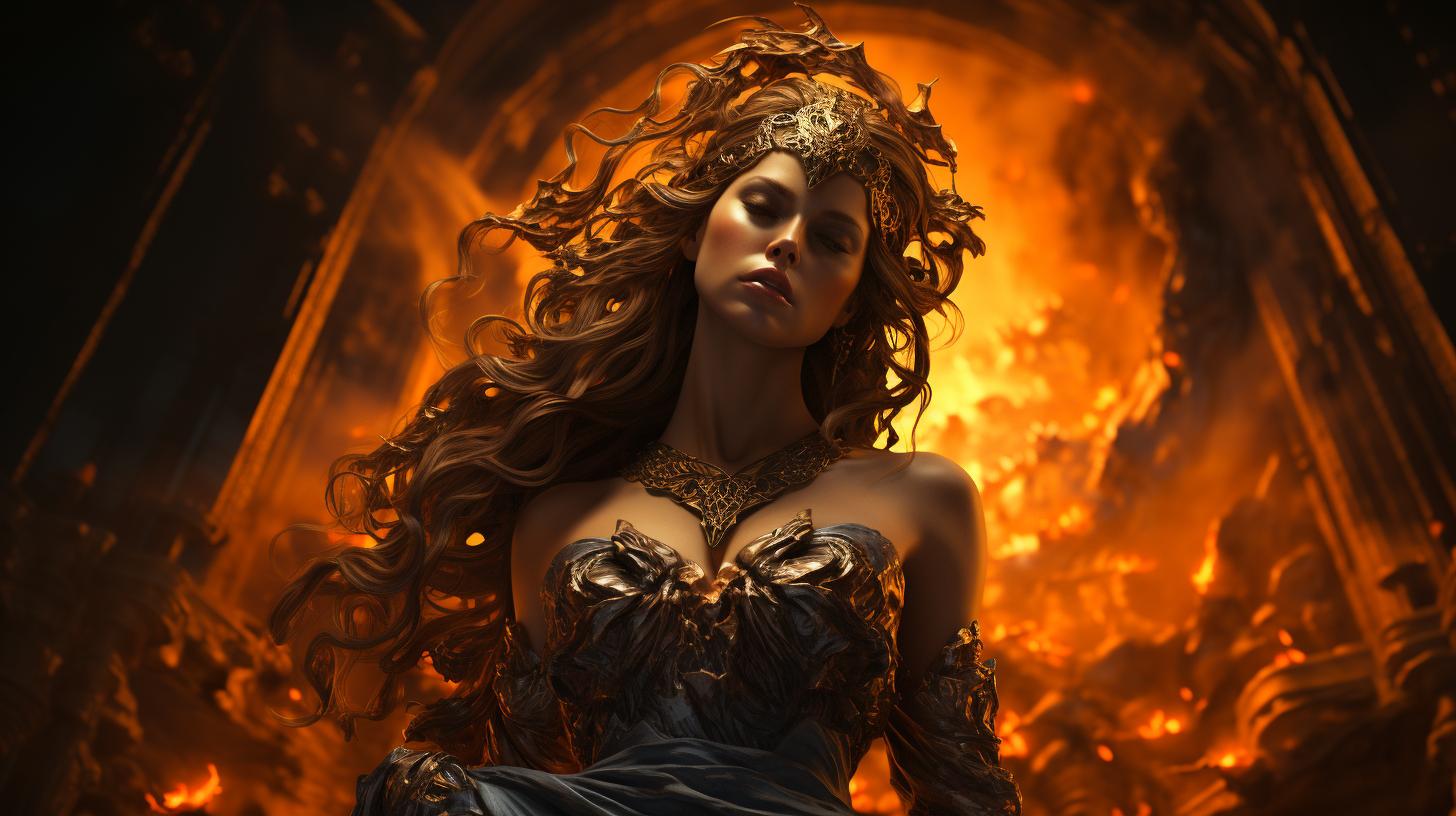Greek Mythology: Ares – The God of War
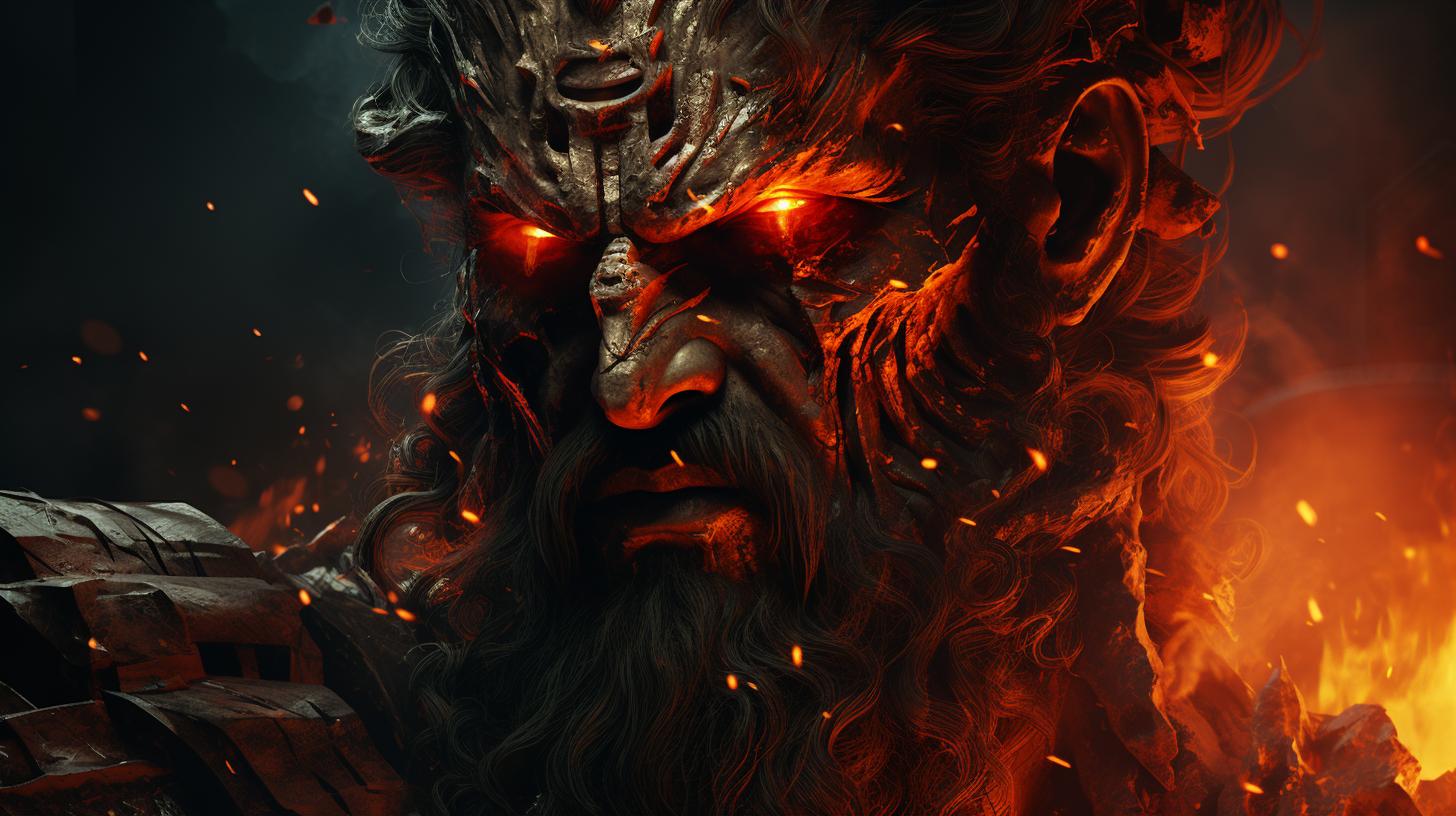
Greek mythology Ares, the god of war, is a prominent figure in ancient Greek mythology and history. Ares represents the brutal and violent aspects of war, while his sister Athena embodies military intelligence and strategic leadership.
Depicted as an armed warrior, Ares is associated with snakes and ominous birds like owls and vultures. He played a role in the Trojan War and had complex relationships with other gods and mortals.
Ares’ cult and worship varied across different regions of Greece, and his Roman equivalent is Mars. Ares continues to influence popular culture through literature, film, and television.
The Origins of Ares: Greek Mythology and History
Greek mythology holds a rich tapestry of ancient gods and goddesses, and one of the most prominent figures is Ares, the god of war.
In this section, we will delve into the origins of Ares, exploring his role in Greek mythology as well as historical references to this formidable deity.
Ares in Greek Mythology
Ares, son of Zeus and Hera, stands as a pivotal figure representing the brutal and violent aspects of war. Often accompanied by his sister Eris and their children Phobos and Deimos, he is associated with the goddess Aphrodite and their supposed marriage.
While Ares’s cult was not extensive in Greece, he played a significant role in various myths and legends, including his participation in the infamous Trojan War. In visual representations, Ares is often depicted as a heavily armed warrior, commanding attention with his imposing presence.
Historical References to Ares
Beyond the realm of mythology, Ares also finds mention in historical records and references. His name appears in ancient texts, art, and inscriptions, indicating that he held a notable place in the minds of ancient Greeks.
Although his worship varied across different regions, certain festivals and cults honored Ares. For instance, Sparta performed sacrificial rituals in his honor, including sacrifices of human nature. These historical references shed light on how Ares was perceived and revered in ancient Greek society.
Ares, God of War: Attributes and Symbols
Ares, the fearsome god of war in Greek mythology, embodies the sheer brutality and violence that accompany battles. He plays a significant role in the pantheon of gods, representing the raw and uncontrolled aspects of warfare.
Ares’ presence is often contrasted with his sister Athena, who symbolizes strategic intelligence and leadership on the battlefield.
Ares’ Role in Greek Mythology
Within Greek mythology, Ares is known as the relentless and impulsive god of war. He is depicted as an unruly warrior, consumed by his lust for conflict and destruction. Ares frequently intervenes in conflicts among mortals, fueling their desire for conquest and bloodshed.
However, his reckless nature often leads to strategic missteps and disastrous consequences.
Depictions of Ares in Art and Literature
Throughout ancient Greek art and literature, Ares is portrayed as an armed warrior, adorned with the regalia of battle. Artists and poets depict him in various forms, showcasing his imposing figure and notorious temperament.
These depictions capture Ares’ fierce countenance, highlighting his ferocity and bloodlust on the battlefield.
Ares’ representation in Greek literature often emphasizes his volatile nature and the chaos he brings to the world.
Epic poems and tragic plays explore his role in shaping the outcomes of wars, showcasing both his destructive power and his vulnerability to defeat.
Ares’ Associated Symbols and Animals
Several symbols and animals are closely associated with Ares, further emphasizing his nature and domain. Snakes and birds of omen, such as owls and vultures, are commonly linked to him, signifying impending destruction and the aftermath of war.
These creatures embody Ares’ ruthless presence and forebode the violence that follows in his wake.
Furthermore, Ares is often depicted with weapons and armor, including his iconic spear and helmet. These symbols represent his commitment to battle and his readiness to engage in conflict at any moment.
The armor signifies his invincibility and the impenetrable protection he dons while leading armies into combat.
- Ares represents the uncontrolled aspects of war, in contrast to his sister Athena’s strategic intelligence.
- Depictions of Ares showcase his fierce countenance and imposing figure.
- Symbols associated with Ares include snakes, owls, vultures, and his iconic weapons and armor.
Ares in Greek Mythology and the Trojan War
Ares, the god of war in Greek mythology, played a significant role in the infamous Trojan War.
Known for his fierce and relentless nature, Ares actively participated in the conflict between the Greeks and the Trojans, further fueling the chaos and violence on the battlefield.
Ares’ Participation in the Trojan War
During the Trojan War, Ares sided with the Trojans, representing the god of war’s affinity for chaos and destruction.
He actively intervened in battles, empowering the Trojan warriors and inspiring them to fight with relentless ferocity. With his presence, Ares aimed to tip the scales of war in favor of the Trojans, creating havoc among their enemies.
Ares’ involvement in the Trojan War extended beyond mere support for the Trojans. He often engaged in direct combat, appearing on the battlefield to fight alongside his favored mortals. Ares reveled in the bloodshed and carnage, embodying the brutal aspects of warfare.
Ares’ Relationships with Other Gods and Mortals during the War
As the god of war, Ares forged relationships, both contentious and cooperative, with other gods and mortals throughout the Trojan War. Often depicted as impulsive and rash, Ares clashed with gods like Athena and Hera, who favored the Greeks and opposed his disruptive presence.
Despite his conflicts with other deities, Ares formed alliances with mortal warriors who shared his affinity for violence and destruction. He favored individuals such as Hector, the Trojan hero, and aided them in their military endeavors.
Ares’ presence on the battlefield instilled fear in the hearts of the Greeks and motivated the Trojan warriors to fight fervently.
However, Ares’ provocation and aggression also earned him the resentment of other gods and mortals, who viewed him as a relentless force of chaos.
His actions during the Trojan War exemplified the destructive power that he embodied as the god of war.
In conclusion, Ares’ participation in the Trojan War demonstrated his unyielding influence on the battlefield and his relentless pursuit of violence and destruction.
His support for the Trojans and his conflicts with other gods and mortals added a dimension of chaos to the conflict, leaving a lasting impact on Greek mythology and the portrayal of war.
Ares’ Family and Relationships
Ares, the god of war in Greek mythology, has a rich familial background and intriguing relationships. Let’s explore his parentage, siblings, and romantic entanglements.
Ares’ Parentage: Zeus and Hera
Ares is the son of the mighty Zeus, the king of the gods, and Hera, the queen of the gods.
Born into the highest ranks of divine lineage, Ares inherits his fierce warrior spirit from his father and his regal authority from his mother.
Ares’ Siblings: Athena, Eris, and Others
Ares has several notable siblings, each with their distinctive roles in Greek mythology.
His sister Athena stands in stark contrast to him as the goddess of wisdom, strategic warfare, and civilization. As Ares represents the brutal aspects of war, Athena embodies its intellect and strategic prowess.
Another sibling of Ares is Eris, the goddess of discord. Eris shares Ares’ inclination towards chaos and conflict, adding fuel to the flames of war.
While Athena and Eris are among his more prominent siblings, Ares has other lesser-known brothers and sisters.
They play various roles in the pantheon of gods and exert their influences in different domains of human existence.
Ares’ Associations with Aphrodite and His Other Romantic Interests
Ares’ most famous love affair is with the goddess of beauty and love, Aphrodite. Their tumultuous relationship scandalizes both gods and mortals alike. The union of Ares and Aphrodite ignites passions and sparks jealousy, often resulting in disastrous consequences.
Aside from Aphrodite, Ares is known for his romantic involvements with other deities and mortal women. These escapades further showcase his impulsive and passionate nature, leaving trails of love and destruction in their wake.
Ares’ complex family dynamic and passionate relationships shape his character and enrich the intricate tapestry of Greek mythology, revealing the multifaceted aspects of the god of war.
Ares’ Cult and Worship in Ancient Greece
Ares, the god of war, held a significant place in the religious practices of ancient Greece.
His cult consisted of various rituals, festivals, and controversial beliefs associated with warfare. Let’s explore some aspects of Ares’ cult and worship in ancient Greece.
Ares’ Rituals and Festivals
The worship of Ares involved intricate rituals and festivals dedicated to honoring and appeasing the god of war. These ceremonies aimed to seek his favor and protection in times of conflict.
The followers of Ares would carry out solemn observances, offering sacrifices, prayers, and dedications to the deity.
Among the notable rituals were the purification ceremonies, which participants believed would cleanse them of impurities and ensure divine support during battles.
These purifications involved ceremonial bathings, sacrifices, and processions led by priests and priestesses devoted to Ares.
Additionally, festivals such as the Aresia were celebrated in different regions of Greece to commemorate and express gratitude for Ares’ role in warfare.
These occasions included various forms of entertainment, athletic competitions, and dramatic performances related to war themes.
Ares’ Worship in Different Regions of Greece
Ares’ worship varied across different regions of Greece, with some areas exhibiting greater devotion and reverence for the god of war. For instance, the city of Sparta held a particularly strong association with Ares, sacrificing prisoners of war as offerings to appease the deity.
In Athens, while not as prominent, Ares still received a level of recognition in certain military contexts. However, his warlike attributes were not as celebrated as those of his sister, Athena, who embodied strategizing and intelligence in warfare.
In other regions, Ares’ worship might have been less pronounced or overlooked in favor of other gods more closely associated with agriculture or marriage. Nevertheless, the cult of Ares had a place in religious life, especially in areas where conflict and warfare were persistent.
Controversies and Sacrifices Related to Ares’ Worship
While Ares’ cult attracted devoted followers, controversies surrounded certain aspects of his worship. Ares’ association with bloodshed and violence made some members of society uneasy, causing debates among philosophers and religious leaders.
Furthermore, the nature of sacrifices made to Ares was a subject of controversy. In addition to traditional offerings of animals and agricultural produce, there were instances where human sacrifices were said to have been dedicated to the god of war.
These practices, although morally troubling, were believed to enhance Ares’ favor and ensure victory in battles.
It is important to note that attitudes toward such sacrifices varied across regions and time periods, with societies eventually veering away from these extreme practices in favor of more symbolic rituals.
Overall, Ares’ cult and worship played a significant role in the religious landscape of ancient Greece, reflecting the complex relationship between warfare, religion, and societal values.
Ares in Greek and Roman Mythology
In Greek and Roman mythology, Ares holds a significant position as the god of war.
This section explores the relationship between Ares and his Roman equivalent, Mars, as well as Ares’ influence on Roman culture and beliefs.
Ares’ Roman Equivalent: Mars
Ares’ counterpart in Roman mythology is Mars. The Roman god Mars shares many similarities with Ares, representing the same aspects of warfare and conflict. Mars was also considered the father of Romulus and Remus, the legendary founders of Rome.
Romans revered Mars as a powerful deity, attributing their military prowess and success to his favor.
Ares’ Influence on Roman Culture and Beliefs
As the Roman equivalent of Ares, Mars played a crucial role in shaping Roman culture and beliefs. The Romans saw Mars as a divine protector of the state and a guardian of agriculture.
They believed that his favor was instrumental in ensuring prosperity and victory in battle. Mars was deeply intertwined with Roman religious practices, with various festivals and rituals held in his honor throughout the year.
The Romans viewed war as a necessary and honorable endeavor, aligning with Mars’ association with warfare. Mars’ influence extended beyond the military realm, as he was also considered a stabilizing force in Roman society, upholding the social order and ensuring the city’s safety.
Romans sought Mars’ blessings and guidance before engaging in any significant undertaking, particularly in matters of war and territorial expansion.
Furthermore, Mars’ association with Ares allowed Greek cultural elements and myths to merge with Roman beliefs, further enriching Roman mythology. Mars’ divine lineage and involvement in Greek-inspired tales, such as the Trojan War, became a part of Roman storytelling and cultural heritage.
Ares in Popular Culture: Impact and References
Ares in Literature, Film, and Television
Ares, the god of war from Greek mythology, continues to influence and inspire various forms of artistic expression. In literature, there are numerous works that feature Ares as a central character or explore themes related to war and conflict.
One of the most notable examples is Homer’s epic poem, the Iliad, where Ares plays a significant role in the events of the Trojan War.
In film and television, Ares has been portrayed in various ways, depicting his fierce and brutal nature.
Whether as a main antagonist or a supporting character, Ares’ presence adds a sense of intensity and conflict to the storylines. Popular movies like “Wonder Woman” and TV shows like “Xena: Warrior Princess” have showcased Ares’ complex character and his impact on the narrative.
Ares’ Influence on Modern Interpretations of War and Conflict
The concept of Ares as the god of war has left a lasting imprint on contemporary interpretations of war and conflict. His representation as a violent and chaotic deity has influenced how society perceives and portrays war in various art forms.
Ares’ association with aggression and brutality serves as a reminder of the devastating consequences of war.
Moreover, Ares’ character has been explored metaphorically, representing the darker aspects of human nature and the destructive forces that can arise during times of conflict.
This symbolic representation allows for deeper exploration of the psychological and emotional impact of war, shedding light on the complexity of human nature in times of violence.
Furthermore, Ares’ influence can be seen in military strategies and tactics, with his association with battlefield prowess and the brutality of combat influencing historical and modern military thinking.
This connection to war and conflict helps shape and inform discussions and interpretations about strategic decision-making and the consequences of armed conflicts.
Overall, Ares, the god of war, continues to have a significant impact on popular culture, inspiring literature, film, and television, while also influencing modern interpretations and discussions surrounding war and conflict.
.











